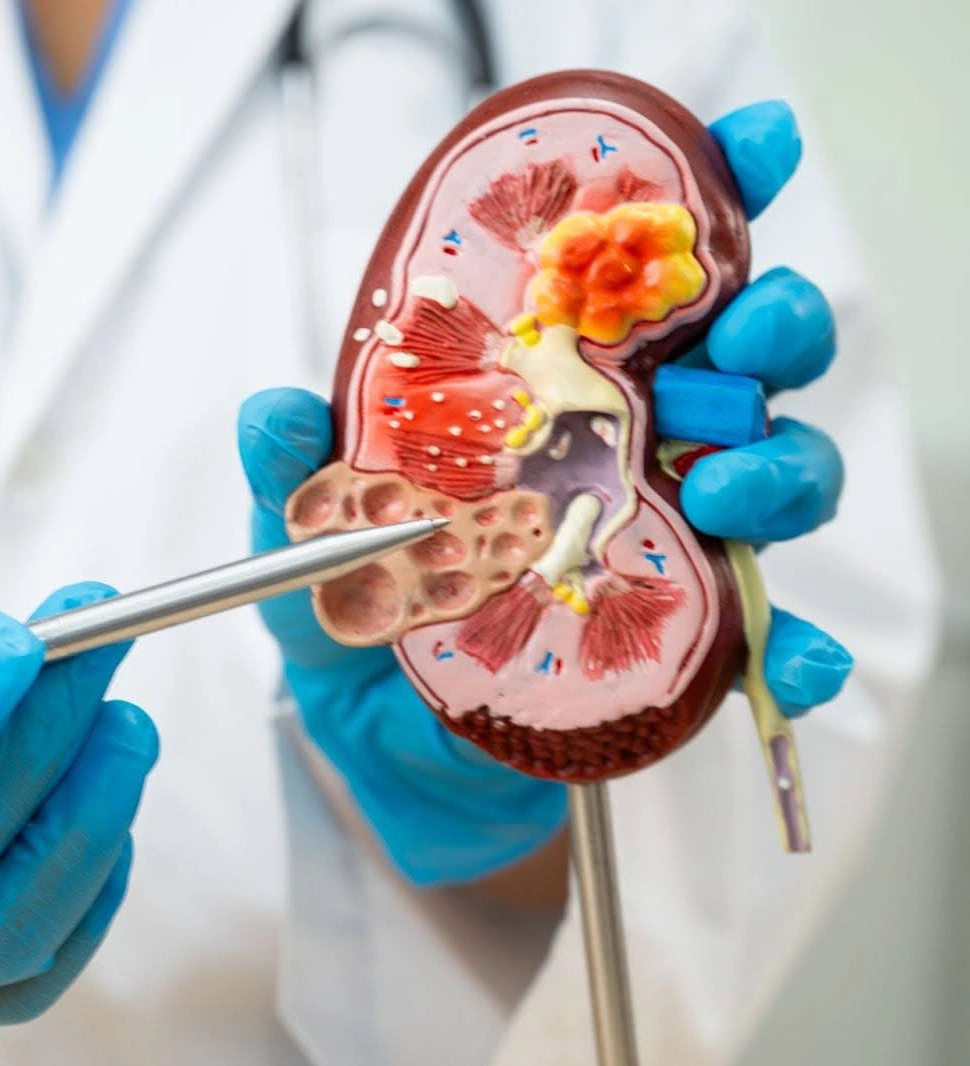Chronic kidney disease is a serious disease that slowly impairs kidney function. Our kidneys are valuable organs in our bodies that perform multiple functions such as filtering out waste products, maintaining water balance, regulating blood pressure, balancing the body’s pH, and producing hormones such as erythropoietin and calcitriol [1]. Damage to the kidneys can cause serious health issues.
Chronic kidney disease (CKD) refers to the loss of renal or kidney function which persists for at least 3 months. In essence, overworking the kidney eventually leads to damages to the kidney structures, such as hypertrophy and nephrosclerosis (hardening of the nephrons), leading to loss of function [2]. CKD has many triggers and risk factors that gradually lead to its pathophysiology, such as diabetes mellitus, hypertension, glomerulonephritis, and polycystic kidney disease.
CKD is rarely detected during its early stages due to a lack of specific symptoms. In fact, up to 94% of patients with mild to moderate loss of kidney function and almost half of patients with severe loss of kidney function go undiagnosed [1]. Furthermore, early stages of CKD may be asymptomatic, with symptoms only appearing after irreversible damage to the kidneys have occurred. Even then, the symptoms may still be non-specific, leading to a difficult diagnosis [2].

Common symptoms of CKD usually appear in the advanced stage of the disease, and the symptoms can develop slowly over time as the disease progresses. Typical symptoms of CKD include [3]:
As CKD indicates loss of kidney function, clinicians use the following to evaluate kidney function and disease stage:
Staging of CKD evaluates the state of kidneys and their ability to function. The National Kidney Foundation of the United States and Kidney Disease: Improving Global Outcomes have come up with a set of guidelines to stage CKD based on eGFR and/or uACR levels:
Chronic kidney disease is multifactorial, several of the known risk factors are [3]:
As kidney functions are compromised in CKD, many parts of the body will be affected from the effects of impaired kidney functions, such as accumulation of waste and inability to regulate pH and blood pressure. Several known complications of CKD include [2, 3]:



If you suspect yourself or a loved one may have CKD, or is at high risk for CKD, a visit to a healthcare provider should be prompted. Diagnosis of CKD can be done in several methods, the first being taking your symptoms and medical and/or family history, this allows the doctor to identify possible causes of CKD, such as high blood pressure or diabetes.
Next the doctor will order several tests to evaluate your kidney function and to identify whether damage to the kidneys are present. These tests include:
Unfortunately, there is no complete cure for chronic kidney disease, and it may progress to kidney failure if not treated. Treatment options are available to alleviate symptoms, manage or reduce complications, and slow down the disease progression.
Managing the likely cause of CKD can slow down its progression, this may include managing underlying conditions such as hypertension, diabetes mellitus, or stopping medications that cause harm to your kidneys [2]. Some of these treatment include managing:
KDIGO treatment guidelines recommend maintaining blood pressure below 140/90 mm Hg in CKD patients. Common medications prescribed to lower or maintain blood pressure are angiotensin converting enzyme (ACE) inhibitors and angiotensin II receptor blockers (ARB) [2].
Changes in diet may be necessary to reduce the workload on the kidneys, these may include low protein diets, Mediterranean diets, diets low in calorie, salt, and potassium. In addition to dietary adjustments, getting more exercise was also reported to slow down eGFR decline [5].
CKD patients often are diagnosed with cardiovascular diseases. The use of statins in CKD stage 1 and 2 patients is commonly done to lower cholesterol levels and provide cardiovascular protection. CKD stage 3 patients may require a combination of statin and ezetimibe for better blood cholesterol control [5].
High blood sugar or hyperglycemia can damage the kidneys, lowering blood sugar in diabetic CKD patients is important for this reason. Antihyperglycemic drugs can be used to maintain blood sugar. Examples of these medications include sulfonylureas, (e.g. glibenclamide and glimepiride), glinides (e.g. repaglinide and nateglinide), and metformin.
Reach out to your doctor if you have concerns of developing or worsening CKD if you have any of the risk factors listed above.
As CKD progresses, impaired kidney function will cause other issues and complications in your body. Your doctor may prescribe you medications to treat these complications:
Anaemia is a common complication of CKD and is usually treated with erythropoietin hormone treatment, additional iron supplements may also be used [2].
Calcium and vitamin D supplements, as well as synthetic calcitriol hormone, can be taken to maintain bone health and calcium absorption.
To combat the effects of low serum bicarbonate levels, patients are recommended to take sodium bicarbonate or sodium citrate to regulate pH levels [2].
Patients with CKD also suffer from swelling or oedema caused by fluid retention, treatment of fluid retention can be done by taking diuretics.
End stage renal disease is also sometimes called kidney failure, with 85-90% of the kidney function lost. At this stage of CKD, the only available options are dialysis and kidney transplants:
Dialysis involves removing waste products from the blood as the kidneys are no longer able to do so. There are two types of dialysis – haemodialysis and peritoneal dialysis.
Kidney transplants involve taking a healthy kidney from a donor and replacing the damaged kidneys with it. Donors can be from living donors or from deceased donors. Due to the shortage of donors, kidney transplant recipients may wait years before being able to undergo the surgery.
A kidney transplant is a treatment for end stage CKD, and not a cure. Transplant patients will need to take immunosuppressants to prevent the body from rejecting the kidney. Furthermore, not every CKD patient is a suitable candidate for a transplant.
As CKD involves permanent kidney damage and loss of function, it cannot be completely cured. However, its progression can be slowed or halted with the right treatment. Early detection and the right treatment can also halt the progression of the disease.
Chronic kidney disease can be a complicated disease to manage, and due to difficulties in early detection, it may go unnoticed until it is too late. Consulting your doctor if you are concerned with developing CKD is crucial for monitoring and possible early detection, especially if you have one or more of the risk factors associated with CKD.
Yes, managing your health can be a good start to reduce the risk of kidney diseases. Some of these include:
Some people never get diagnosed for kidney diseases despite having severe kidney impairment. Most of the symptoms of CKD are non-specific and may lead to incorrect diagnosis. You may need to visit a healthcare provider if you:
Without treatment, kidney failure can be fatal. Treatments for kidney failure such as dialysis or kidney transplants can provide a life expectancy of around 5 to 10 years or 12 to 20 years respectively, some patients also can live up to 30 years.
The life expectancy will also depend on other factors such as age, complications, and disease management.